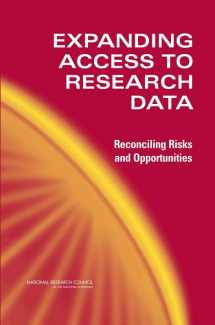
Expanding Access to Research Data: Reconciling Risks and Opportunities
ISBN-13:
9780309100120
ISBN-10:
0309100127
Edition:
1
Author:
National Research Council, Division of Behavioral and Social Sciences and Education, Committee on National Statistics, Panel on Data Access for Research Purposes
Publication date:
2005
Publisher:
National Academies Press
Format:
Paperback
132 pages
FREE US shipping
Book details
ISBN-13:
9780309100120
ISBN-10:
0309100127
Edition:
1
Author:
National Research Council, Division of Behavioral and Social Sciences and Education, Committee on National Statistics, Panel on Data Access for Research Purposes
Publication date:
2005
Publisher:
National Academies Press
Format:
Paperback
132 pages
Summary
Expanding Access to Research Data: Reconciling Risks and Opportunities (ISBN-13: 9780309100120 and ISBN-10: 0309100127), written by authors
National Research Council, Division of Behavioral and Social Sciences and Education, Committee on National Statistics, Panel on Data Access for Research Purposes, was published by National Academies Press in 2005.
With an overall rating of 3.8 stars, it's a notable title among other
books. You can easily purchase or rent Expanding Access to Research Data: Reconciling Risks and Opportunities (Paperback) from BooksRun,
along with many other new and used
books
and textbooks.
And, if you're looking to sell your copy, our current buyback offer is $0.35.
Description
Policy makers need information about the nationâ€"ranging from trends in the overall economy down to the use by individuals of Medicareâ€"in order to evaluate existing programs and to develop new ones. This information often comes from research based on data about individual people, households, and businesses and other organizations, collected by statistical agencies. The benefit of increasing data accessibility to researchers and analysts is better informed public policy. To realize this benefit, a variety of modes for data accessâ€" including restricted access to confidential data and unrestricted access to appropriately altered public-use dataâ€"must be used. The risk of expanded access to potentially sensitive data is the increased probability of breaching the confidentiality of the data and, in turn, eroding public confidence in the data collection enterprise. Indeed, the statistical system of the United States ultimately depends on the willingness of the public to provide the information on which research data are based. Expanding Access to Research Data issues guidance on how to more fully exploit these tradeoffs. The panel’s recommendations focus on needs highlighted by legal, social, and technological changes that have occurred during the last decade. Table of ContentsFront MatterExecutive Summary1 Introduction2 The Changed Landscape3 Benefits of Access4 Risks of Access: Potential Confidentiality Breaches and Their Consequences5 Reconciling the Benefits and Risks of Expanded Data AccessReferencesAppendix A Workshop SummaryAppendix B Biographical Sketches of Panel Members and Staff


We would LOVE it if you could help us and other readers by reviewing the book
Book review

Congratulations! We have received your book review.
{user}
{createdAt}
by {truncated_author}


